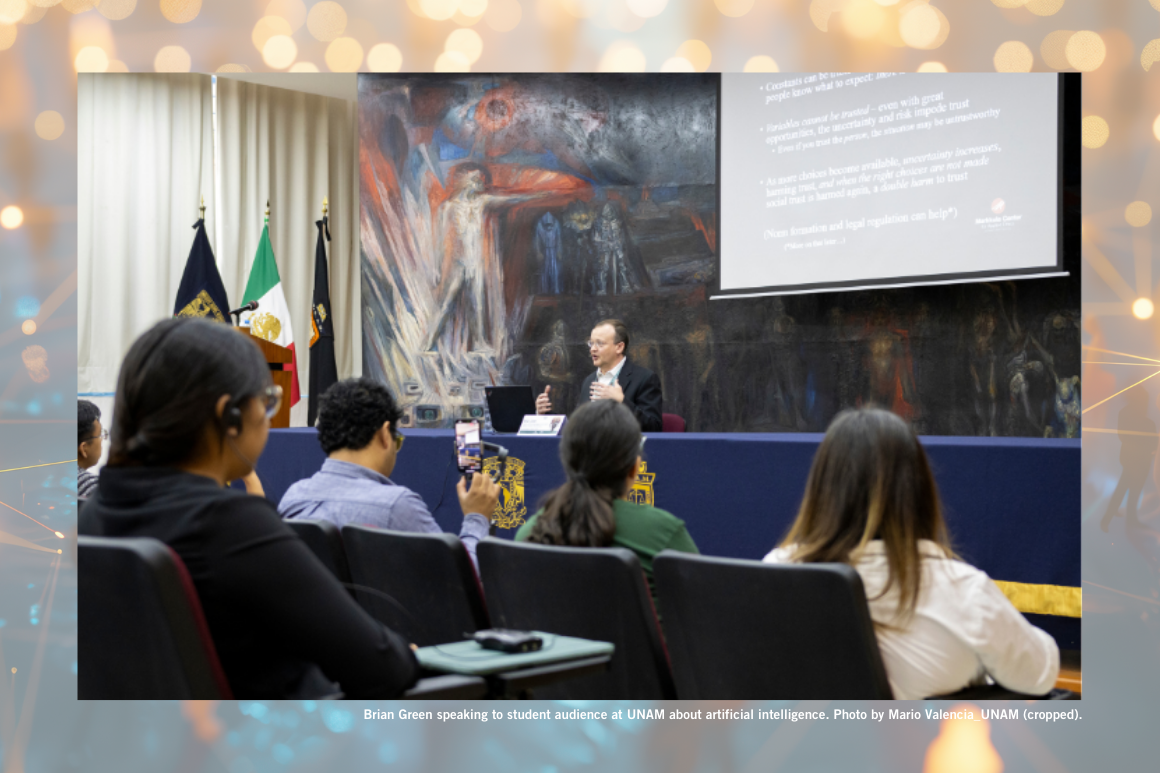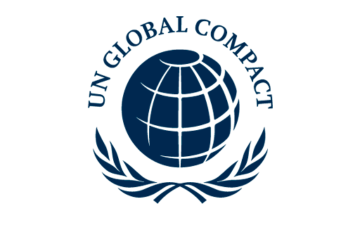The Global Community
This year, the work of the Markkula Center continued to impact communities far and wide, extending beyond Santa Clara University's campus to communities around the world. Learn more about the Markkula Center’s global engagement and what’s been done to work towards the Center’s mission of empowering people and organizations to create a more ethical world.

Sharing the Messages of ITEC and Ethical AI Around the World
Brian Green, director, technology ethics, was invited to speak at two universities in Mexico, Universidad Iberoamericana (Ibero) and Universidad Nacional Autonoma de Mexico (UNAM), presenting at events focused on Artificial Intelligence.
During his brief time in Mexico, Green actively participated in discussions about the ethical use of AI and presented frameworks for designing strategies to guide its application.
Green spoke about the Institute for Technology, Ethics, and Culture (ITEC), and the ITEC handbook, a collaborative effort between the Markkula Center and the Vatican’s Dicastery for Culture and Education. His presentations were met with positive and receptive responses, with event attendees and media representatives showing particular interest in the ethics of using AI responsibly and the impact it might have on society.
While many countries such as the U.S. and China have already integrated AI into work and other social spheres, Mexico is still developing its presence in these areas. Green said, “Many leaders felt a responsibility to use AI responsibly, and university faculty and students felt a need to teach and learn about AI and how to use it ethically.”
As AI continues to have a global impact, it is crucial for organizations in all countries to have tools for understanding how to interact with it positively and ethically.
Markkula Center Reconfirms Engagement with the United Nations

As a member of the United Nations Global Compact (UNGC) since 2003, the Markkula Center submitted its Communication of Engagement to describe actions taken between 2021-24 that support the Global Compact and its principles.
The UNGC, a special initiative of the U.N. Secretary-General, is a call to companies to take action in support of U.N. goals and align their operations with ten universally accepted principles in the areas of human rights, labor, environment, and anti-corruption. It is the largest corporate sustainability initiative in the world.
In the Communication of Engagement, the Markkula Center outlined programs, events, and content produced by the Center that support the Compact’s mission, in addition to direct engagement with corporations.
Highlights included focus on the growing issue of technology and responsible usage of technologies such as AI, particularly in cross-reference with ethical business practices.
Work done by SCU students as participants in Markkula Center fellowships and student programs and collaborators with professional ethics staff was also included, showing continuous and growing engagement in higher education.
Senior Director of Leadership Ethics Ann Skeet, author of the report stated, “As an applied ethics center, we think it’s important to make linkages between the education programs and consulting we do with companies to broader, global goals around corporate sustainability and corporate social responsibility. Our commitment as a participant in the United Nations Global Compact and support of its principles is one key way we do "this".
Visit the UNGC website for more information about the UNGC and to access the full report.
Collaborating with Global Universities on New Humanism
The Markkula Center for Applied Ethics is participating in the capacity-building project New Humanism in the time of Neurosciences and Artificial Intelligence (NHNAI), which aims to empower all stakeholders in the fields of Neuroscience (NS) and Artificial Intelligence (AI) to address relevant ethical issues and developments. The project is coordinated by Lyon Catholic University (UCLy) and backed by the International Federation of Catholic Universities (IFCU).
The project aims to explore the “blind spot” of humanism and pursue fundamental questions of what it means to be human in the background of ethical issues raised by AI and NS.
Director of Technology Ethics Brian Green has been acting as the thematic coordinator for AI Ethics, and the Center’s Managing Director, Thor Wasbotten, serving as project coordinator.
The project began in 2022 and will continue through 2025.

The four main components of NHNAI are:
- Develop a list of the most pressing questions to discuss with various communities of stakeholders and from these discussions, gather academic knowledge;
- Share the list of pressing questions for contributions and insights during further discussions with stakeholder communities through face-to-face workshops and online debates;
- Collect results and share them publicly, through recommendations and whitepapers, with the intention of informing ethics and policy-making efforts;
- Determine ways to continue this capacity-building mission in the future.
To advance these goals, the Markkula Center has initiated a series of conversations with stakeholders including SCU faculty and staff, students, and leaders who represent marginalized members of our community, to address pressing questions and explore ways to benefit humanity as a whole.
